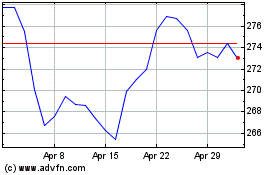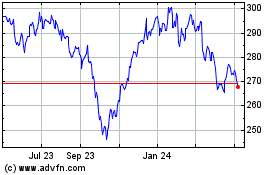By Laurie Burkitt
BEIJING--In an unusual move, American food-processing company
OSI Group LLC vehemently disputed a Chinese court's ruling that it
had sold "inferior products" to fast-food chains in China including
McDonald's Corp. and Yum Brands Inc. and claimed it had been the
subject of a smear campaign.
Challenging a Chinese court ruling is rare for a company trying
to regain ground in the country. China had been OSI's most critical
growth market but its business there was decimated after a 2014
television report purported to show workers in its Shanghai plant
making chicken nuggets and patties from meat that had passed its
sell-by date.
The Shanghai Jiading People's Court said in a statement on its
microblog on Monday that it fined two of OSI's units--one in
Shanghai and another in Hebei province--2.4 million yuan ($365,000)
and sentenced 10 people to prison, including Australian Yang Liqun,
a general manager at OSI in China, who was sentenced to three
years, followed by deportation. Mr. Yang wasn't reachable to
comment. The Australian Embassy in Beijing didn't immediately
respond to requests for comment.
The other nine defendants face sentences from 19 months to 32
months, the statement said.
Shortly after the ruling, the Aurora, Ill., company said it
planned to appeal: "The verdict is inconsistent with the facts and
evidence that were presented in the court proceedings." It said the
Chinese authorities unjustly held OSI employees for 17 months and
barred OSI's senior leaders and reporters from attending the trial.
Prosecutors weren't immediately available to comment.
OSI also said it planned to take legal action against Dragon TV,
the state-run broadcaster that aired the 2014 report, saying it
"made false and incomplete accusations that ignored facts and
Chinese law," the statement said.
Dragon TV didn't respond to requests for comment on OSI's
statement.
OSI's business in China collapsed after the Dragon TV report
aired in July 2014. Shortly afterward, Chinese authorities arrested
six employees of the company's Shanghai unit and launched a
probe.
OSI's initial response to the allegations in the report was
swift and remorseful. Within days, Sheldon Lavin, OSI's CEO,
apologized for "completely unacceptable" missteps at the
company.
Since then, however, OSI has attempted to question the veracity
of the allegations.
Internal OSI documents reviewed by The Wall Street Journal
indicate that a review the company conducted after the scandal
found that a disgruntled former employee and two journalists staged
the report by Dragon TV.
The reporters used fake identifications and the TV station
worked in concert with food-safety watchdogs, the document said,
adding that before the report finished airing in 2014, authorities
closed the plant where the reporters worked and ordered an
investigation.
The document said Dragon TV aired the report without judicial
review and confirmation. Asked about the assertions in OSI's
internal report, Dragon TV earlier declined to comment.
Companies that have invested millions in the Chinese market
rarely push back against government decisions or openly dispute
legal setbacks. The long tally of businesses that have issued
public apologies in China includes McDonald's, French grocer
Carrefour SA and Apple Inc.
In its statement on Monday, OSI said it "can no longer accept
injustices against our people and our reputation." It said it saw
itself "forced to consider an appeal through all legal channels in
order to eventually be granted a just, evidence--based
verdict."
OSI had poured capital into China to build up chicken farms and
meat-processing units to supply fast-food chains--foreign and
domestic--across the country. In 2013, it opened its ninth and 10th
plants in China, part of a $750 million investment. The plants had
been processing 50,000 tons of food a year.
But after state media showered criticism on OSI in the wake of
the television report, fast-food chains including McDonald's, Yum
Brands and Burger King, cut ties with the company, which had been
one of the biggest suppliers by volume in China.
As a result of the report, McDonald's, which relied heavily on
OSI's supplies, faced a shortage of hamburgers for months, leading
to sales losses.
It isn't clear how much OSI is currently processing. People
within the industry say OSI lost more than $1 billion after the
food-safety allegations paralyzed its operations across China. The
company laid off 340 employees from its Shanghai plant in September
2014.
Business groups said a pattern of increased scrutiny of foreign
firms by government officials and state media has contributed to a
cooling of foreign business sentiment about operating in China.
Monday's ruling reflects a tough stance that leaders are taking
against food-safety issues in China, where scandals have caused
many deaths and undermined trust. Leaders laid out new food-safety
laws this year that set harsher punishments and stronger oversight.
The government frequently acts against foreign companies, making
high-profile examples of them to teach lessons to domestic
firms.
Authorities haven't released findings of their investigation
into OSI's practices. They destroyed batches of the meat that had
been recalled in the incident. Several people briefed on the
situation said tests haven't revealed any safety problems.
The court statement said OSI violated China's food safety law by
selling substandard food.
-Lilian Lin contributed to this article.
(END) Dow Jones Newswires
February 01, 2016 09:58 ET (14:58 GMT)
Copyright (c) 2016 Dow Jones & Company, Inc.
McDonalds (NYSE:MCD)
Historical Stock Chart
From Mar 2024 to Apr 2024

McDonalds (NYSE:MCD)
Historical Stock Chart
From Apr 2023 to Apr 2024
